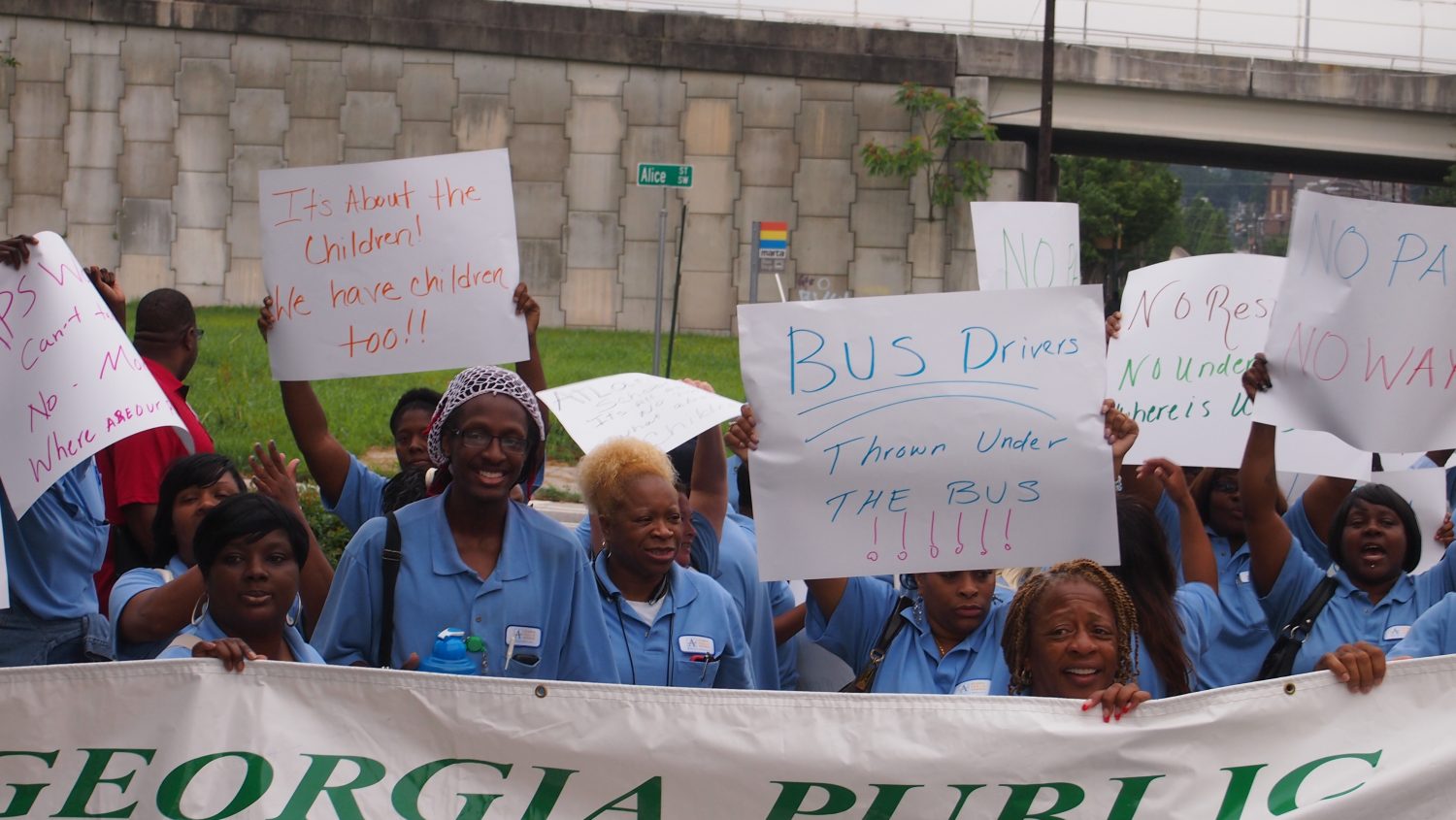 Bus drivers from APS have been protesting since the beginning of the school year, citing issues with salaries and poor communication from the system.
Bus drivers from APS have been protesting since the beginning of the school year, citing issues with salaries and poor communication from the system.
The problem started when APS bus drivers were asked to come into work five days early, said Helen Cox, a representative for the American Federation of State, County and Municipal Employees, the union that represents the bus drivers.
Cox said the bus drivers were informed that they would be paid extra for the five days of training. After the drivers worked the hours, however, APS made a policy switch, according to Cox.
“They were told that they … would not be getting paid extra,” Cox said.
APS spokesperson Kimberly Green did not comment on whether bus drivers were told they would be paid extra.
She wrote in an email, however, that although bus drivers had to report five days early, these days will be made up later.
“Professional learning days are planned throughout the school year for teachers,” she wrote. “Bus drivers and monitors, who would normally work these days, will not have to report for duty on five of the professional learning days, thereby making up for the earlier report date.”
Cox said another issue the bus drivers had with the early start was the manner in which it was communicated to them.
“First of all, the process wasn’t uniform,” Cox said. “People found out through Facebook, some people received phone calls, some didn’t. There wasn’t a letter that went out, and the administration has admitted that it was poor communication.”
Green did not comment on the manner in which bus drivers were told they should report earlier.

Cox also said the early report times interfered with the bus drivers’ other obligations.
“People had to quit summer jobs which was payment that they were relying on,” Cox said. “They also had to find care for loved ones.”
In addition to being denied the extra pay, bus drivers have encountered other problems with paychecks during the year, Cox said.
“Folks aren’t paid for field trips sometimes, they sometimes aren’t paid at all,” Cox said. “There was one woman, Stephanie, who didn’t receive a paycheck at all since Oct. 1. She was going to lose her house because of that and so they ended up paying her properly but it took several days. It causes difficulty when you don’t have money in the bank that you were expecting.”
Quentin Hutchins, who has driven buses for APS for 16 years and graduated from Grady in 1990, said “what [APS officials] are trying to do is not pay us hourly because the district will lose more money and basically this is what we are fighting for.”
Hutchins said that he and other drivers are exploring every path to resolving the issue.
 “We are attending every board meeting,” Hutchins said. “We are trying to get to the board members who are in charge of Atlanta Public Schools.”
“We are attending every board meeting,” Hutchins said. “We are trying to get to the board members who are in charge of Atlanta Public Schools.”
Hutchins said that neither APS Superintendent Erroll Davis nor Director of Operations Larry Hoskins has met with bus driver representatives about the protest.
“They are refusing to meet with us,” he said. “It seems like when we have a scheduled meeting it’s either cancelled or postponed so there is always a conflict in trying to rectify the situation. It could have been rectified … it’s something that should not be dragging on.”
Green wrote that APS has attempted to meet with representatives of the protest.
 “A mediation was scheduled for Oct. 16, but representatives of the bus drivers cancelled the meeting informing APS administrators that ‘the mediation scheduled for Wednesday has been taken off the calendar,’” Green wrote.
“A mediation was scheduled for Oct. 16, but representatives of the bus drivers cancelled the meeting informing APS administrators that ‘the mediation scheduled for Wednesday has been taken off the calendar,’” Green wrote.
Hutchins said that since the current APS leadership does not seem willing to negotiate, he and other bus drivers have been volunteering to help “candidates that would be able to restore confidence in the people who they hired.”
Hutchins said his message to APS leadership is simple.
“Right the wrong,” he said. “They put the policy and procedures, they put the ethics policy and procedures in place and they are not following them. It’s just that simple. These drivers … have families that they have to support. It’s not the biggest paying job but its most important because we transport over 25,000 students each day, and that’s half of the district.”







